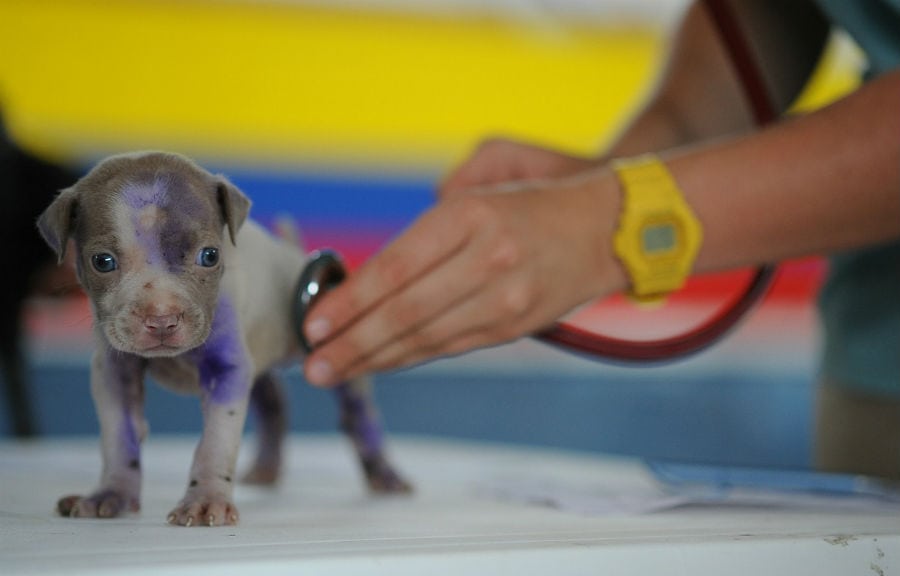 The total dog pancreatitis treatment cost will involve both the diagnosis and the treatment. To diagnose pancreatitis, the cost should range between $250 and $700. This price mostly varies if other diseases must be ruled out or not.
The total dog pancreatitis treatment cost will involve both the diagnosis and the treatment. To diagnose pancreatitis, the cost should range between $250 and $700. This price mostly varies if other diseases must be ruled out or not.
For a small dog with mild pancreatitis, treatment can cost as little as $50. For a large dog with more severe pancreatitis, this cost could be up to $400.
Most cases of pancreatitis will cost roughly $100 to $200 to treat. If the pancreatitis is very severe, it could require hospitalization. Hospitalization will quickly bring the cost into the $1,000 to $3,000 range; possibly even more.
Treatment Cost Breakdown
- Diagnosis
Vomiting can have many causes in dogs. It can be difficult for a veterinarian to quickly figure out what the issue is.
This condition will typically require a physical exam on your dog and this would cost between $50 and $80, depending on your area.
To diagnose pancreatitis, they will draw blood and do a test for pancreatic enzymes. This test is roughly $40 to $80.
Your veterinarian may also run a chemistry panel and a CBC to decide how serious the pancreatitis is and how best to treat it. This will cost $150 to $200.
If pancreatitis is not your veterinarian’s first suspicion, they may need to perform more diagnostics. In young or unvaccinated dogs, parvovirus is a major concern. There is a rapid test for parvovirus which costs $20 to $60.
Your veterinarian may also want x-rays. This is to look at your dog’s organs and to see if it has eaten anything it shouldn’t have. This will cost $120 to $250.
In higher-end clinics, ultrasounds may also be available as a diagnostic tool.
- Treatment
Once your dog is diagnosed with pancreatitis, your veterinarian will begin treatment. There is no cure for this condition, so treatment includes supportive care by knowing how to comfort a dog with pancreatitis.
Most dogs with pancreatitis are severely dehydrated from vomiting. Fluids will be given to help rehydrate your dog.
If they are given under the skin, called subcutaneous, the cost will be about $10 to $45. If fluids are given intravenously and an IV catheter is needed, the cost will be around $30 to $60 instead.
Because it is unlikely that your dog will keep oral medication down, your veterinarian will use injectable medications. These can include anti-nausea drugs (typically Cerenia), anti stomach acid drugs (typically Famotidine), and pain medication.
After the first injections, your dog will likely be sent home with pills of these medications.
Depending on the exact drug and dosage used, the anti-nausea injection should cost $10 to $40 for a 10-pound dog. For a 50-pound pooch, the cost would be in the $50 to $100 range.
Anti-nausea medication to take home will cost $12 to $80 depending on your dog’s size.
Anti-acid drugs, on the other hand, are cheaper than anti-nausea. Injectable antacids would be in the $5 to $20 range for most dogs.
Anti-acid medication to take home will cost roughly $10 to $30.
Depending on the severity of pancreatitis, your dog may receive pain medication.
There are many pain medications for your veterinarian to choose from. A pain injection’s price would usually range from $15 to $50.
This price could be much higher if your dog requires certain medications. Take-home pain medication would be around $20 to $60 for otherwise healthy dogs.
- Diet
Your dog will need to be placed on a bland, low-fat dog pancreatitis diet. There are prescription foods for gastrointestinal upset.
Initially, veterinarians often recommend to cut off food. When your dog is ready to eat once again, it will only be allowed to eat low-fat food so as not to over-stimulate the pancreas.
You can find thousands of high-quality, low-fat dog food in the market today which may cost around $18 to $70. Some vets would recommend these commercial foods to supplement actual dog food for a small period of time or for the rest of the dog’s life, depending on the case.
While your dog is recovering, you can also choose to feed your dog low-fat food such as boiled skinless chicken breast with steamed rice. This food may entice your dog to eat and be more gentle on the stomach than commercial dog food.
- Hospitalization
Dog pancreatitis treatment at home is usually recommended after treatment is given by the veterinarian. If it is severe enough for hospitalization, pancreatitis in dogs treatment cost can quickly rise to a few thousand dollars. In fact, hospital fees may start at $1,200 for every 24 hours.
In rare cases, surgery may be required. This will cost $2,800 to over $5,000.
- Antibiotics
If the condition becomes severe and some parts have become so diseased, they may have released some bacteria. If this is the case, an antibiotic prescription may be in the offing.
If the diarrhea is severe enough, your doctor may prescribe metronidazole. This is not only an antibiotic but will also calm the intestinal system.
This medication is fairly inexpensive and will cost around $10 to $30.
Pancreatitis Explained
The are many reasons a dog may experience vomiting and diarrhea. In an adult dog who has been fully vaccinated, pancreatitis is a common reason. Other symptoms can include refusing to eat, abdominal pain, and lethargy.
If your dog is experiencing these symptoms, it is important to get them to a veterinarian right away.
The pancreas is responsible for making digestive enzymes. For various reasons, these enzymes can be activated while still in the pancreas.
This causes the pancreas to become inflamed and pancreatitis follows. This inflammation can lead to permanent damage to the pancreas.
Pancreatitis can range from mild to life-threatening. It is possible for pancreatitis to be a one-time disease for your dog, but it can also be a frequent life-long issue.
In many cases, the cause of pancreatitis may never be determined. Certain breeds also seem to be more prone to it than others.
The cause in these dogs can be especially difficult to determine. Dogs fed a high-fat diet are at most risk.
Thanksgiving and Christmas are lovingly called “pancreatitis season” as many dogs become sick from eating table scraps.
Other risk factors include obesity and diabetes. Cushing’s disease and hypothyroidism are also risk factors for pancreatitis. Making sure your dog’s weight and diet are managed well will go a long way to help prevent pancreatitis.

Additional Concerns and Expenses
- Reoccurrence
Once a dog has had pancreatitis, they are at high risk to have it again in their lifetime. Strict diet (no table scraps!) and weight loss should be considered for the health of your pet.
- Diabetes
Another serious complication that may arise when the pancreas becomes severely damaged is the development of Diabetes Mellitus. Management of diabetes costs around $700 to $2800 per year. If left untreated, cataracts may also develop which can lead to surgery which can cause $3,500 to $4,500.
